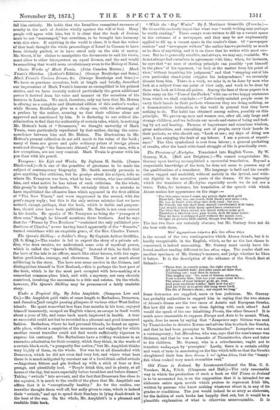"While the Boy' Waits." By J. Mortimer Granville (Frowde.)— Mr.
Granville modestly hopoi that what was " worth writing may perhaps be worth reading." These essays were written to fill up a vacant space- in the columns of a newspaper, and they may be not unpleasantly applied to fill up a vacant space in the reader's time. Of "newspaper readers " and " newspaper writers " the author knows probably as much as he does of anything, and it is on these that he writes with most suc- cess. But he is generally sensible, and always, we may say, readable. We do not always find ourselves in agreement with him ; when, for instance, he says that " no man of sterling principle can possibly 'put himself in the place' of his opponent, or look at the matter from his point of view,' without impairing his judgment," and that "stepping out of his own particular stand-point cripples his independence," we certainly dissent from him. There is a work, we take it, to be done by men who look at a subject from one point of view only, and work to be done by those who look at it from all points. Among the best of these papers is a little essay on the "Uses of the Pocket," with one or two happy sentenees- from which we shall conclude :—" Laboriously-minded people 808E11 to carry their hands in their pockets whenever they are doing nothing, as a demonstrative intimation to the world in general that they have nothing to do. The habit has obtained among sailors, possibly on this principle. We grown-up men and women are, after all, only large and strange children, and we indicate our moods and states of being and feel- ing by act and bearing. Persons of importance and conscious wisdom, great authorities, and consulting sort of people, carry their hands in their pockets, as who should say, "Look at me ; my days of doing are past; I am enjoying the fruit of my labour. I am a person of experi- ence." The idea symbolised is rest from labour; a general pocketing of results, after the hand-with-hand struggle of life is practically over.






































 Previous page
Previous page